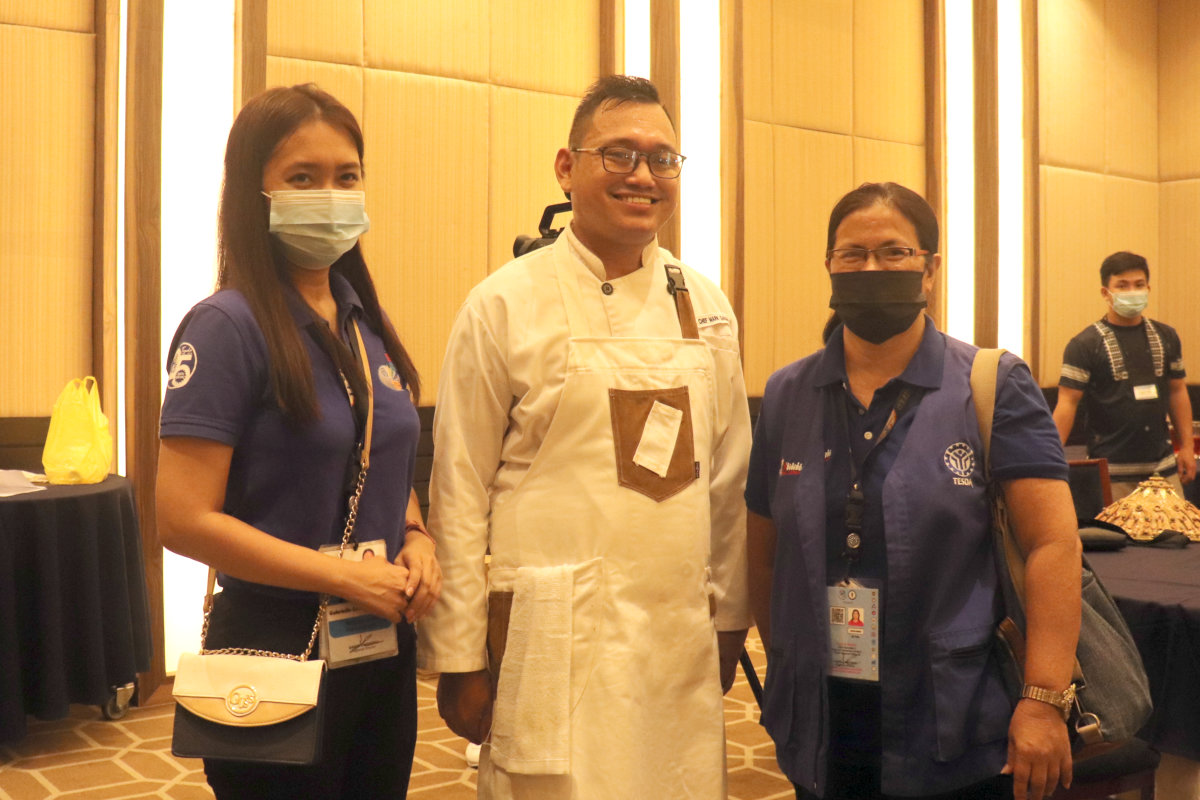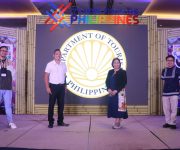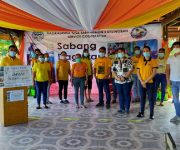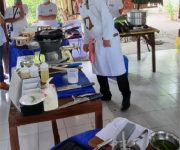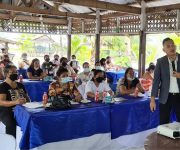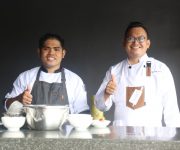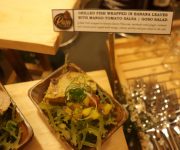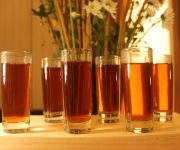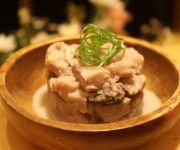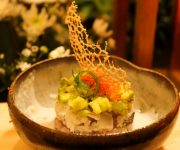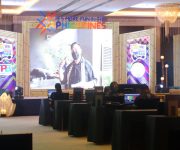The talents that Evsunistas guzzle encapsulated vast array of skills that are developed through the years. It may take some time to be recognized but it’s all worth it.
Professor Mark Sabayan has quite unique success story and the arduous narrative that he has created an unfolding story of inspiration and commitment combined to arrive at where he is right now.
His story started when he was an apprentice of his late grandmother in the kitchen when he was just a lad, he used to taste foods before consumption, and he observed a lot of kitchen etiquette that his grandmother did when cooking session started. Little did he know that his life will be revolving around the scope of his grandmother’s interest that will form part as to who he will become in the years to come, even broadening culinary skills through experience, training, and researches.
Yes, Sir Mark is an academician; as an instructor at Eastern Visayas State University, he integrates theory and application in his discussion with the students. He is a current faculty member of the College of Technology- Hospitality Management Department, and he is handling courses related to Hospitality Management programs.
EVSU gives him opportunities to unleash his skills in teaching and to cascade the culinary adroitness that he possesses to the students, a selfless gesture of a professor, indeed.
However, his life does not only revolve in our beloved institution, he even outstretches his influence by heralding his passion in cooking through local, national, and international rendezvous. The Regional Director of the Department of Tourism, Karen Santiago Tiopes, requested him to participate in one of activities. He was asked to present proposals as to how to promote waray cuisine. He was given a link, but when he gets into the web interface, he was amazed as to the presence of some well-known participants by which he was just used to attend to before, but right now, he is speaking to these connoisseurs whom he used to admire. He was given a thumbs up, and the panelists like the proposal. He presented buffet spread of different preparations with kinilaw as appetizer.
He articulately presented germane topics in food services such as food safety practices, cooking methodologies, and basic culinary math which includes standardized recipes, costing, and pricing. One of the staff got interested with the proposal and he was invited to attend training leading toward becoming the first culinary trainer in Region 8.
Later on, with the increasing influence in food services and technology, he launches project ASPIRE (Aim to Train Sustainable Food Producers Initiating Reforms and Enhancement). For Professor Mark, this is one of the waterloos of culinary landscape in the region. A number of cook and chefs are good at recipe making, concoction, but publication through manuscripts of the recipes are scarcely valued.
“My project ASPIRE is the flagship banner under DOT- Region VIII.” It has been approved, and that is tantamount to saying that he becomes accrediting person in Region 8. He is the first accredited culinary trainer in the region.
Sir Mark believes that the visibility of waray cuisine can be promoted to the world by exploring kitchen and food recipes. Waray cuisine has much to offer, but it is seldom promoted. In fact, he recounted that he was quite hesitant to invite a friend to eat out in the city because the menus served are almost monochromatic. Much to his dismay, he even goes to say that local cuisine is underestimated, while international cuisine is given more importance and is adhered to by the locals. You can see Korean restaurant, Japanese restaurant, among others. This is something that he wants to let people realize about not neglecting food culture of the region- “An atun pagkaon, natatabunan nan foreign cuisine.” he recounted.
His passion to culinary arts extends to helping small business enterprises and beach resorts to promote and be creative in food presentation so that there can be sustainability of the business venture. He likes providing training to the latter so that they will not be deficit or experience breakeven, but they can yield meaningful profit to pay off the resources that they invested.
Food is significantly pivotal in boosting tourism and economy of the region. He recounted that tourists do not only visit a place because of its “instagrammable” landscape of nature, but they look into the culture, and one way to explore the culture of the region is by knowing the taste of the locals. They can appreciate and understand more of the local people because of the food that they serve. Interestingly, waray food services have much to offer, more importantly, it is tantamount to being world class cuisine, if prepared properly. For example, among the kinilaw preparations in the country, only Warays prepare kinilaw with coconut milk, a manifestation of richness of coconut in the region. Surprisingly, kinilaw was served as one of the foods to Magellan upon his visit. The interlink between culture and food cannot be denied. As you eat waray cuisine, you are chewing a piece of history that leaves an indelible flavor of our very own heritage.
As a College Instructor
Sir Mark teaches with a heart and he moves people by the narrative of his experience. Some graduates keep in touch with him despite their successful life abroad, in cruises, and even in renowned hotels. They still ask advice from Sir Mark, expecting for words of wisdom from a former professor. Moreover, he never fails to connect with them; he encourages them to learn foreign cuisine, but advising them not to forget to go back to the hometown and promote and preserve Waray culture. “Get experience and promote our food service, in that way they can help boost tourism and food industry in the region.” Sir Mark added.
With regard to Waray culture, he asserts that ours is getting wider visibility. We have moron and other foods that are unique to the region, and he wants visitors to experience food that they haven’t tried before. “I really want to promote what cuisine we have to other people” Sabayan asserted.
Debacles on being Culinary Professor
Asked anent the sustainability of apparatuses in hotel and restaurant laboratory, Prof. Sabayan argued, “We lack tools and equipment.” As a matter of fact, some pieces of equipment cost thousands or even millions of pesos. And these are greatly needed to expose our students as to what and how a real culinary world looks like. In this regard, he has to spend money from his own pocket just to satisfy kitchen needs alongside the passion to bring out the best practices in food preparation. Meanwhile, he admittedly asserts the Faculty members need to be exposed to food safety compliance trainings, growth and development to cascade their insights to the students for a much more meaningful curricular output. “We need to grow and adopt to what is on trend nowadays, and that’s the time we will grow, Sabayan added.
In the regional level, he envisions for a widespread acceptance of Waray cuisine by locals themselves. The problem with business centers in the region is that we have been overwhelmed by international cuisine, and that ours is covered with obscurity. This should not be the case, his profession will revitalize the food culture of waraynon and promote the heritage of pure waray food technology crafted with innovativeness which is accepted to the global taste.
Recently, he is learning about food photography so as to present and capture food in the most palatable way.
How did he achieve this success in life?
Professor Sabayan fueled up his success journey with passion and commitment blended with bitter sweet experience of real life struggles in the field of gastronomic career. “I did not expect anything about those successes in life. I did not except that it will happen,” said Sir Mark. He even accentuates on the importance of setting goals in life. Goals are roadmap to one’s success, and this will guide the person toward achieving the things that he/she wanted the most. Without a goal, one can never know where he is going. He sees pandemic as a motivation to elevate the story of hope that there must be silver lining after the tempest. “I have found pandemic as one of the points in life where I used my time to be more productive, and it give me opportunity to look for my weakness and develop it as one of my hobbies.” Amazingly, this does not only satisfy his hobbies, but he becomes a source of inspiration to aspiring food experts in the region. He always tells his students to do their best and everything will just come into proper places.
As Department Extension Coordinator
Being an expert in Hospitality and Tourism, he likes to help small enterprises and resorts as regards food security, preparation, and presentation. With his knowledge both in theory and application in food innovation, he wants to divulge such to businesses whose main service is food and catering needs. “Gusto ko sumulod hit EVSU to give them right foundation, to help them grow. Small enterprises tend not to hire College graduate; we fill that gap, and we train those staff to become trainers in Hospitality Industry.” Prof. Sabayan believes that one should be erudite in the field of Hospitality Management and Food services. Hence, training and seminars will be offered not only to fortify department linkages but also to really help business personnel in valuing the best services to their clienteles.
Greatest achievement
Needless to say, his heart belongs to the kitchen and hospitality services, and he wants to bring those quality services to Tacloban, not by going abroad. He even gives advice that whenever gastronome goes abroad, he/she may explore on diverse food preparations, but more importantly, he/she should bring innovative technology and make Tacloban a gateway of food innovation. By encouraging co- kusineros/ kusineras, he goes on to say, “Gain experience, but make Tacloban one of the known places in culinary industry.”
Finally, inspiring people is one of his ultimate mantras in life. They must transform people not by the best taste their hands can offer to one’s gustation, but by the passion the latter can touch to see the better taste amid life’s bitter experiences. The best recipe of life is not what is sautéed with other additives, rather, it is a heart that keeps the fire burning in the name of assiduity and preservation of one’s heritage.
Professor Mark Sabayan is an Instructor at Eastern Visayas State University. He is an alumnus of the same university where he took Bachelor of Science in Hotel and Restaurant Technology way back 2011. He advanced his professional career and earned his Master in Management at Leyte Normal University in 2015. His academic finesse and pragmatic knowledge of gastronomic world bring him to success he is savoring at the moment.




